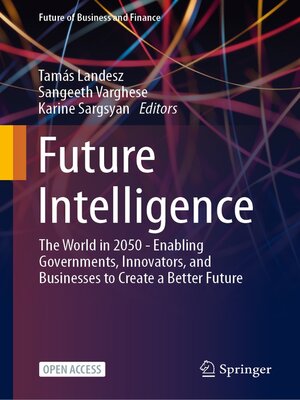Future Intelligence
ebook ∣ The World in 2050--Enabling Governments, Innovators, and Businesses to Create a Better Future · Future of Business and Finance
By Tamás Landesz

Sign up to save your library
With an OverDrive account, you can save your favorite libraries for at-a-glance information about availability. Find out more about OverDrive accounts.
Find this title in Libby, the library reading app by OverDrive.



Search for a digital library with this title
Title found at these libraries:
| Library Name | Distance |
|---|---|
| Loading... |
The first quarter of the 21st century introduced the world to rapid uncertainty, be it the social-political and financial crises, or pandemics, or the shaking up of well-established democracies with an increasing rise in populism. At the same time, the technological promise has taken off with automation, artificial intelligence, and nanotechnologies increasingly becoming an economic reality. This open-access book brings together experts of specific domains, through the windows of their experience, and in a crowdsourced fashion, to analyze these world developments to develop an overall view, a compelling case of what we should be prepared for, as we march towards 2050.
Topics covered include the future of leadership, the future of solving global challenges, and designing a way of life in harmony with nature. Other topics include disruptive entrepreneurship, the relevance of geographical borders, game-changing future innovations, education, and networked learning, interplanetary travel, and communication. The book also places an importance on the role of empathy, mindfulness, presence, and sharing becoming the anchors for future decision-making by 2050. Of general interest to anyone eager to understand the future of the world, this book is particularly useful for planners, policymakers, strategists and entrepreneurs.
Topics covered include the future of leadership, the future of solving global challenges, and designing a way of life in harmony with nature. Other topics include disruptive entrepreneurship, the relevance of geographical borders, game-changing future innovations, education, and networked learning, interplanetary travel, and communication. The book also places an importance on the role of empathy, mindfulness, presence, and sharing becoming the anchors for future decision-making by 2050. Of general interest to anyone eager to understand the future of the world, this book is particularly useful for planners, policymakers, strategists and entrepreneurs.







